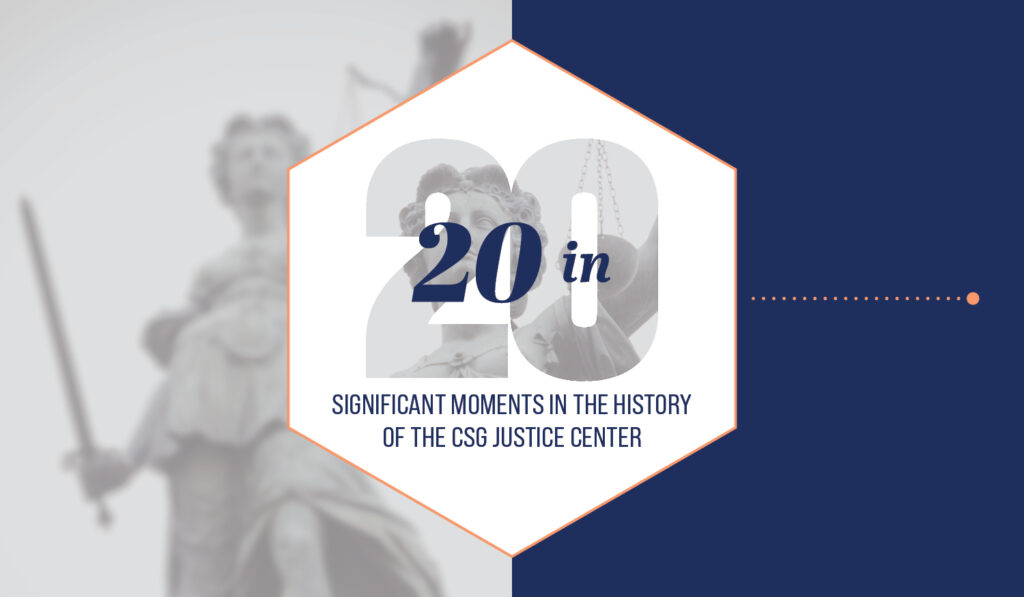

Over the past 20 years, the CSG Justice Center has grown from a staff of two in one city to more than 120 employees across 23 states and Washington, D.C. In that time, the Justice Center has partnered with national and state leaders throughout the country to impact the field — whether through legislation, direct assistance, convenings or groundbreaking reports. This timeline lays out some of the most significant moments in the organization’s history.
- 2002 – The Consensus Project report is published.
- There are two employees based in New York City (still within the Eastern Regional Conference) — Michael Thompson and Renée Brackett.
- 2004 – Congress authorizes the Justice and Mental Health Collaboration Program — a federal program that the CSG Justice Center has supported since its inception.
- 2006 – CSG makes the Justice Center a national program and appoints an advisory board to help guide the center’s work.
- 2007 – With the CSG Justice Center’s assistance, Texas and Kansas pass Justice Reinvestment legislation to avert growth in their prison population; these two pieces of legislation help spur the creation of the Justice Reinvestment Initiative, which becomes one of the CSG Justice Center’s signature initiatives.
- 2008 – The Second Chance Act, a first-of-its-kind piece of federal legislation, is signed into law with bipartisan support to improve reentry outcomes; the CSG Justice Center was among several national organizations to back this legislation.
- 2010 – The CSG Justice Center hosts its first national summit on Justice Reinvestment and Public Safety at the U.S. Capitol.
- 2011 – The CSG Justice Center hosts its first 50-state convening on reentry and recidivism.
- 2012 – There are 73 employees across 11 states.
- 2014 – By this year, 20 states have used a Justice Reinvestment approach with the CSG Justice Center’s assistance.
- 2015 – Collaborating with two national partners, the CSG Justice Center launches the Stepping Up initiative, its first campaign, to reduce the number of people with mental illnesses in jails across the country.
- By this year, the organization has provided technical assistance to 1,000 grantees through the federal Justice and Mental Health Collaboration Program and Second Chance Act programs.
- 2016 – The CSG Justice Center launches the initiative now known as Improving Outcomes for Youth (IOYouth).
- 2017 – The CSG Justice Center convenes a 50-State Summit on Public Safety in Washington, D.C., leading to its first web-based data analysis covering all 50 states.
- The CSG Justice Center launches the Face to Face initiative, its first project designed to directly connect policymakers to the people impacted by the criminal justice system.
- 2018 – CSG Executive Director David Adkins names Megan Quattlebaum the second director in the organization’s history.
- 2021 – In response to the COVID-19 pandemic, the CSG Justice Center hosts a virtual conference exploring innovative first response options, with the U.S. attorney general as a featured speaker.
- 2022 – The CSG Justice Center and the Bureau of Justice Assistance launch Justice Counts, a first-of-its-kind national coalition to provide policymakers with accurate, accessible and actionable data.
- The CSG Justice Center and several national partners launch Reentry 2030, a 50-state campaign to transform successful reentry across the country.
- There are 120 employees across 23 states and Washington, D.C.
This article appeared in the CSG Capitol Ideas magazine (2022, Issue 4). View current and past issues at csg.org/publications/capitol-ideas.




